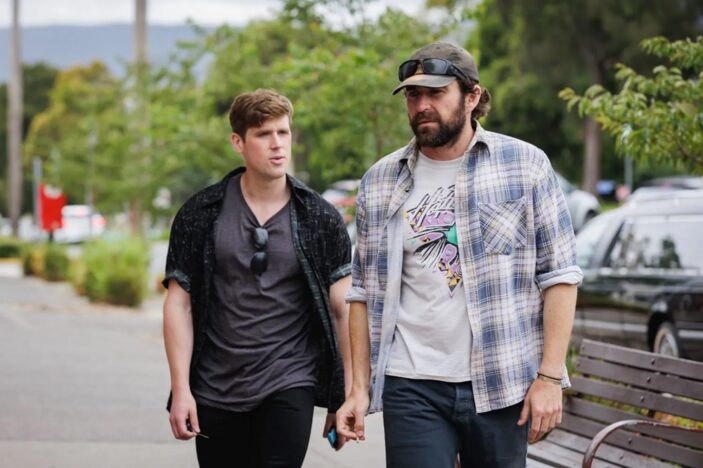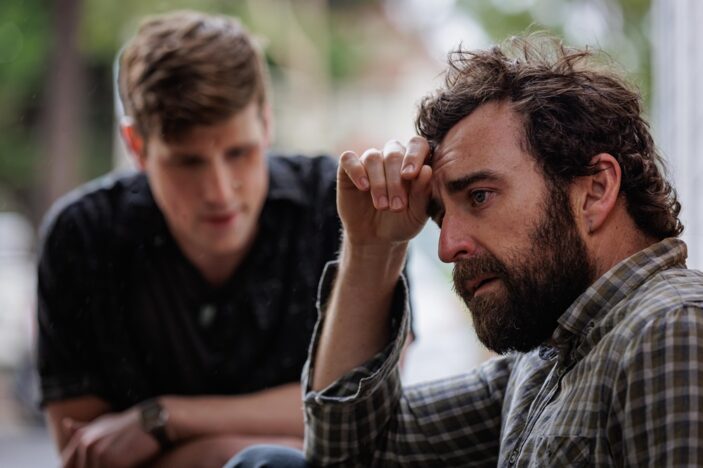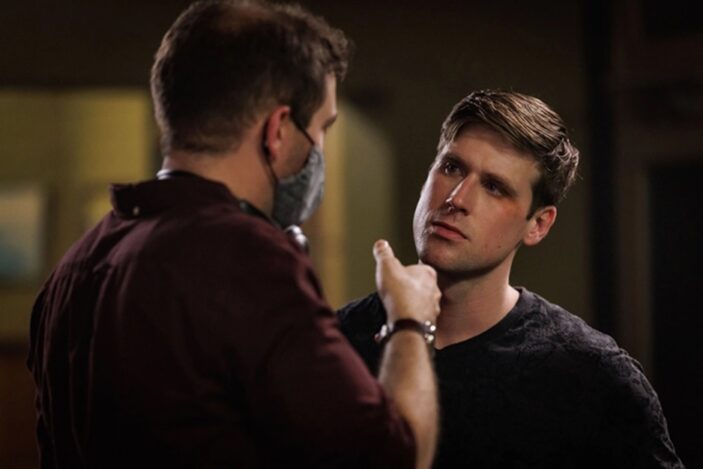
Two estranged brothers are forced back into each others lives when they’re tasked with scattering the ashes of their recently deceased mother in the country town where she grew up.
Such is the logline for Australian director Henry Boffin’s directorial debut, Strange Creatures, starring Riley Nottingham and Johnny Carr as the aforementioned brothers who reevaluate their relationship across the film’s “engaging” runtime; read the rest of our review here.
As the film opens in select theatres across Australia this week, our Peter Gray spoke with both Riley and Johnny about drawing on any personal experience to shape their characters, if any scene proved most pivotal to understanding their objectives, and balancing the script’s unique tone.
Anytime an Australian film gets a theatrical release, I’m barracking for it. I’m of the age where I don’t want everything to go to streaming, so it’s great to see something like Strange Creatures get this type of release.
Johnny Carr: Yeah, I think Riley and Rachel (Forbes, producer), and everyone, they’ve done a great job to get (Strange Creatures) out there. I think (the story) will translate really well to cinema. I’ve seen a great patch of Aussie stuff come out at the moment, and there’s a lot of great, new voices in Australian cinema. And I’m with you, it’s nice that you can go (to the cinema) and see it, if you have the opportunity to. I think it’s so good that we aren’t letting go of that experience.
With these characters of yours, they’re very much existing in their own reality, but they play off each other quite organically. Regarding the individual development of Nate and Ged, were you drawing on any personal experience or past roles to shape your performances?
Riley Nottingham: For me, if anything, it was almost a suppression of who I am. It’s the opposite of how I would do stuff a lot of the time, at least how Nate (my character) starts off. There’s so much that’s unspoken and so, for me, I was almost suppressing every normal instinct I’d have. I gotta say, I was probably modelling it on Henry (Boffin, writer and director), because he can be quite stoic. I’ve known him for years, and I know him quite well, so I was doing my best Henry impression.
Johnny Carr: Yeah, I think I feel like I know a lot of men, in particular, who have these incredibly big hearts, but haven’t learned how to access it and share it properly. And I think sometimes that can get portrayed in a way of saying, “These men are broken” or “They’re not trying.” And that can be true, but I think that’s an easy label to chuck on it. I think it’s that thing of wanting to share, wanting to connect and that yearn to connect, but not having the tools to be able to do it properly. I think that, for me, was pretty lived. I know people like that and have had to try to find ways to connect with them using that mode of going, like, “Okay, what feels safe for you?” So that was something I thought about a lot. I think underneath that, (my character) is someone who’s really lonely and really craving connection.
I think one of the earlier moments of the film that gave me a good insight into the characters and allowed me to go on this journey was when Nate says he has a boyfriend and Ged goes outside and kicks the bin in seeming anger. On the surface it would appear this is a reaction to him being gay, but we say that it’s not that at all. We almost expect a sense of toxic masculinity about Ged. But he’s just a character, as you said, you hasn’t had that access to express his feelings in the manner he wants. There are so many nuances to Nate and Ged. We see that these are fully formed characters. And they may not say things we like, but that doesn’t mean we don’t like them.
Johnny Carr: I think that’s an interesting moment to explore, when he says he has a boyfriend and Ged storms out. Your first take is that he’s a homophobe, or his problem is with Nate being gay, is that correct?
Yeah. It’s nice to have it confirmed that it’s a separate issue.
Johnny Carr: I don’t know if it’s a red herring, or something, but I think it’s a nice little flip on that trope. Or that archetype. I think Henry did a great job of exposing those flaws in the characters, sort of laying them bare at times, but it’s free of judgement. There’s so much polarity in the world, and here you have two people that are so fucking different in many ways, yet they find a way to meet in the middle.

Did either of you find there was a particular scene or moment in the script that you felt was pivotal to understanding your character?
Johnny Carr: Great question.
Riley Nottingham: I think all the stuff when we we’re driving. Because we did that over a couple of days, and we kind of saved it all up for those scenes. That was really great, because there’s the script, but we would just talk when we’re driving. You do the shot, but then you have to drive like a kilometer back the other way to do it again and it was just really good soaking time to just talk shit.
Johnny Carr: I remember hearing that, when I was younger, they would say the best way, if you had a teenage son, the best way to communicate with them was going for a drive. You don’t have direct eye contact with them. You have a shared goal, or destination, as minor as it can be, and it gives you the space to communicate without having to say, “Hey, how you going?” It’s this indirect kind of thing. I think in some ways, I guess when Jed accepts, or offers up, that he will go on the road trip, that’s a big concession. I think even to just say “I’m prepared to travel with you in this confined environment”, and yes he has a lot of push and pull within that, but I think even signing up for the mission is a big moment.
Going off that, was there anything that didn’t make the final cut, or maybe it wasn’t even in the script, that brought about discussions or specific nuances regarding the backstories of your characters that helped inform your relationship?
Riley Nottingham: I think we established the question of how long it had been since Jed and Nate had spoken. We had spoken about if this was the first time in years, or had there been occasional contact? I remember that being a big thing.
Johnny Carr: I remember mapping out a timeline with Henry for Ged. We had those conversations about how long had they been in touch. And I think we sort of landed on that maybe it was Nate who had reached out, but there was no response from Ged. (This film) is the first time they have seen each other properly, or been in the same space.
With the film finding ways to break up its drama with bouts of humour, did you find it something to be mindful of in how to approach a scene?
Johnny Carr: I think that’s really a tonal thing. Like, when I first read (the script) and I was talking to Henry, I was seeing what he was trying to pitch. We kept talking about Nebraska, that beautiful film, and I watched that a bunch. You don’t really know what the tone of that film is. It sits in this strange no man’s land, in a way, and I think, for me, because what’s on the page is really funny, I was going more for how serious Ged takes himself. And I knew that would work on both ends.
Riley Nottingham: That’s for sure. I spoke to Henry about that, because there’s a super funny version of every single thing we did. Sometimes the really funny version of the scene was almost, I don’t want to say magic realism, but it was kind of kooky. I think it was just about finding that fine line. The situation is so serious, so if you go funny, the tone can be such a hard thing. You have to ask “What movie are we in?” I was certainly leaning on Henry a lot for that, because there are some great moments of comedy that come out. Like, one of the best, and I don’t even think it was scripted, was Johnny in the background of one of the motel scenes just doing karate.
Johnny Carr: It wasn’t in the script, yeah. I kind of thought, “Could this be funny?” I felt like Ged was a restless character, and maybe he’s watched some MMA videos or tai chi. I don’t really know, but I’m a big fan of getting tidbits of characters that aren’t explained. We project so much, and if you get even so much as a tail end of a conversation coming into a scene, or something that makes us something. It just fleshes the character out and their history more. I’m a big of that stuff that makes people work a little bit harder.

And Riley, you’re a producer on this. Does that change how you interact with people on set? As opposed to how you would navigate as an actor?
Riley Nottingham: I met Henry in 2010, and that’s when I pitched him something, and he came on board to direct it. I was also writing, acting, producing…and I kind of learned from the first few projects of how intensive it is to do both roles on set. There are some directors who act, and they do a great job, Ben Affleck comes to mind, but you can step in and act and watch. It’s still a creative role. Producing, there’s so many logistics and money, and all this stuff that is really about the end product.
When you’re acting, you don’t want to be thinking about the end product. You’re thinking about right now. So Rachel Forbes is the other producer, and (this movie) couldn’t have been done without her. There’s a lot in the pre-production process regarding money and investors and crew, and on set I didn’t really do anything. I would pick it all back up in post (production). I tried not to be a producer on set. Did you feel that, Johnny?
Johnny Carr: I didn’t feel that. I think it’s a wise move to do it that way, too. I think the potential trap is, and I haven’t done it, but one can erode the other a little bit. I think having that delineation or split between roles is important. You can concentrate. Your eyes are on the prize. I think you did a great job juggling that.
Riley Nottingham: Thank you. It’s a team effort, though. I feel like producer is just another name for professional organiser. Or the office manager. It’s just bringing everyone together and saying, “Let’s get on this ship together and go for a sail.”
Strange Creatures is screening in Australian theatres from November 21st, 2024.
